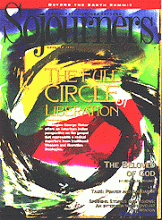From junior high school well into college, I was often given the explanation that "politics is the allocation of resources and services...a distribution of power." The first half seemed quite tangible, the second half rather nebulous. I have since discovered some essentials are missing from the definition, since politics is something more.
Organizing for Social Change: A Manual for Activists in the 1990s (Seven Locks Press, 1991, $19.95, paper) brings clarity to these two descriptions of politics and adds other needful elements in understanding the nature of political/public life. "The personal is political: Organizing is overwhelmingly about personal relationships. It is about changing the world and changing how individuals act together," write authors Kim Bobo, Jackie Kendall, and Steve Max.
Organizing for Social Change in 26 chapters covers everything one needs to know about working toward social change at the local, state, and national levels. The book is centered around the organizing principle of direct action. While the authors do not suggest that direct action is the correct or sole form of organizing, they present a number of reasons for their focus and method.
"Direct action implies a majority strategy," they say. Its effectiveness is at its best with issues that "a majority of the population would support, or at least not actively oppose." From their work with the Midwest Academy in Chicago, a training institute for progressive organizers and activists, the authors have found that direct action has built up local activist-based organizations as well as larger state and national coalitions. The principles and examples discussed in the book are applicable to electoral, educational, union, service, public interest, advocacy, and legal organizing.
Read the Full Article

